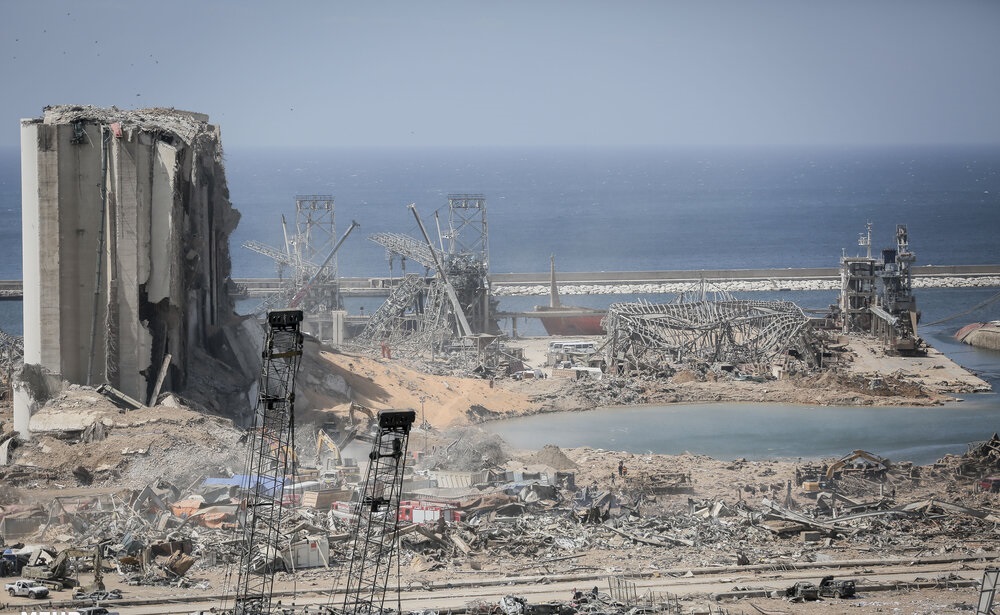Driving along the corniche in Beirut you’ll notice a large, rust pink building without windows, doors, or walls with a large white sign that reads, “Stop Solidere.” This is the Saint-George hotel. What was once a hotspot for famous actors and diplomats in the mid-20th century is now a wobbly structure riddled with bullet holes from the Lebanese Civil War. For many, it serves as a reminder of Beirut’s hardships and its people’s resilience. For others it symbolizes plain devastation. After the August 4 explosion, it seems as though all of Beirut looks like the Saint-George.
Although the original explosion happened nearly 6,000 miles from Tregaron, its effects are present in the WIS community. WIS alumnus Faysal Al-Kibbi ‘20 remembers being in a state of complete disbelief, shock, and worry for his family after hearing about the explosion.
“My whole family is in Beirut. My uncle lives near the port so half of his apartment is destroyed, and my cousin had to receive stitches on the hospital floor because of glass cuts. I was just extremely worried about my family’s well being,” Al-Kibbi said.
The explosion equivalent to the magnitude of a 3.3 earthquake occurred around 6 p.m. after a warehouse caught fire and produced a colossal blast. A supersonic wave shattered nearly all of the city’s glass, and as a result 300,000 people were made temporarily homeless and at least 190 people died. According to Beirut’s governor, the total losses could reach up to $15 billion, which is the last thing Lebanon needs in an already catastrophic financial crisis.
The warehouse at the port of Beirut was a storage space for 2,750 tonnes of ammonium nitrate, that was reportedly brought to the port in 2013 after facing technical issues on a trip from Georgia to Mozambique. The ship remained docked in Beirut as a result of a legal dispute over port fees. Since 2013, there have been several warnings filtered to Lebanese authorities about the danger of storing such an explosive chemical in a populated region like Beirut. Despite multiple warnings, the government failed to act.
Port officials that supervised the ammonium nitrate were reportedly hired under former Lebanese Prime Minister, Saad Hariri, and were placed on house arrest in order for the Lebanese government to conduct a full investigation. Current president Michel Aoun and Prime Minister Hassan Diab had both suggested that the explosion could have been a result of an external interference by a rocket or bomb. Following this statement, many Lebanese were unimpressed with the government’s lack of accountability and as a result many protests ensued in the following weeks.

The Lebanese people weren’t the only ones unimpressed by the government’s handling of the explosion aftermath. French President Emmanuel Macron stated last Tuesday that if the Lebanese government did not take the necessary steps towards a commitment program against fraud and corruption, the international community would impose sanctions on Lebanon. Macron did not specify the types of sanctions that would be imposed.
The Lebanese government is still slow to implement a full fledged response to the explosion, as another warehouse has caught on fire within the last week. This second fire hasn’t resulted in any casualties, but it has contributed to the vast number of critiques against the Lebanese government.
After the explosion, several people in the WIS community had a difficult time grasping the severity of the incident. New WIS sophomore, Sara Oueijan, recalls being terrified for her loved ones back in Beirut.
“At first I did not understand the depth of the situation until I realized the extent of what had happened. I was worried and terrified, all I could think about was if my loved ones were okay and safe,” Oueijan said.
Sara and her sister Yasmine, who is also new to WIS as a junior, took initiative by helping out with a disaster relief campaign called LoveliBeirut, where they sorted and boxed items that would be shipped out to Lebanese families affected by the explosion. The campaign can be reached on Instagram @LoveliBeirut.
This explosion has not only affected WIS’s students, but teachers as well. Arabic teacher Reda Assad often visits Beirut, and is saddened by the explosion. Though Assad is hopeful that Beirut will overcome these times, and demonstrate its resilience once again.
“Beirut will rise again like the phoenix through our resilience and will power,” Assad said. “We pray for the safety of Beirut, and the rest of Lebanon.”
By Dean Atassi

































































